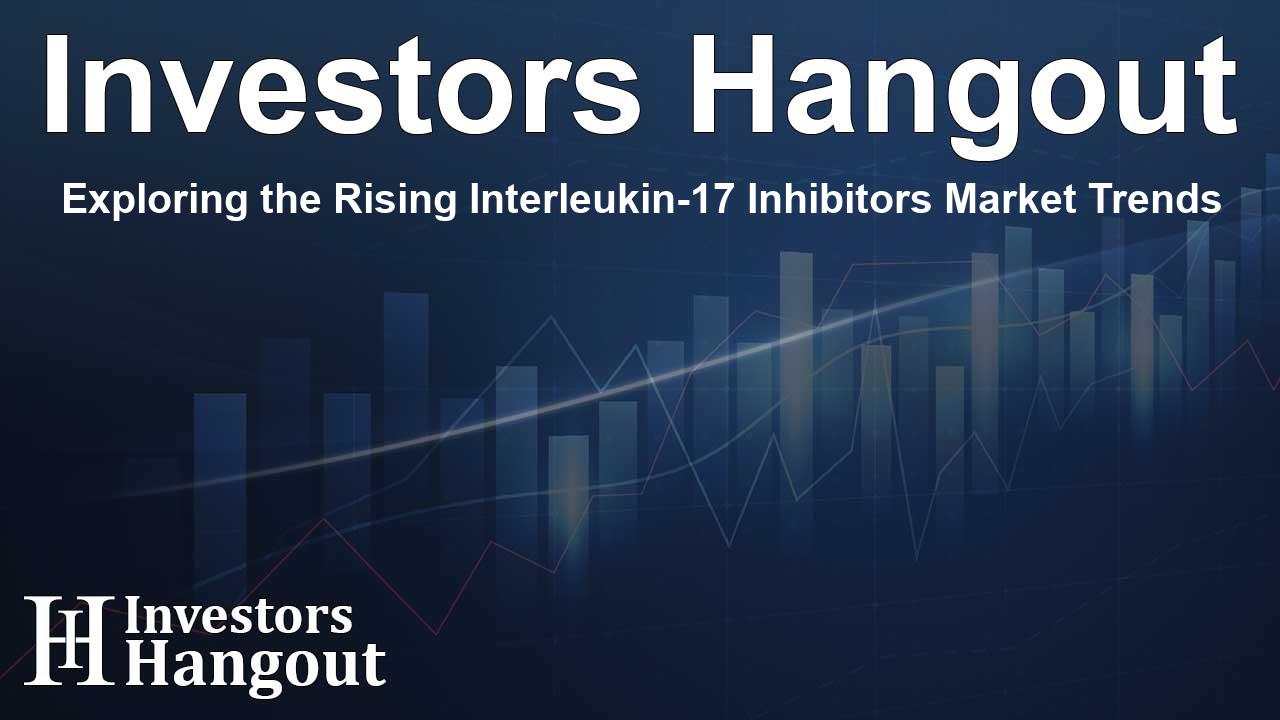Exploring the Rising Interleukin-17 Inhibitors Market Trends

Interleukin-17 Inhibitors Market Overview
The interleukin-17 inhibitors market is on an upward trajectory, especially in the fields of rheumatology and dermatology. These innovative therapies, particularly for conditions like psoriasis and psoriatic arthritis, are gaining traction. With advancements in biologics such as sonelokimab and izokibep, the market dynamics are shifting, offering targeted therapies that may surpass earlier IL-17 inhibitors.
Market Potential and Patient Population
Current estimates suggest substantial market growth for interleukin-17 inhibitors in key therapeutic areas. The market report provides insights into the potential patient population for indications like plaque psoriasis, hidradenitis suppurativa, and psoriatic arthritis. Companies involved in developing new therapies are expanding their portfolios to address these conditions.
Key Players in the Field
Market leaders such as MoonLake Immunotherapeutics, Affibody Medical AB, DICE Therapeutics, and Eli Lilly are at the forefront of developing the newest interleukin-17 inhibitors. Their innovative products are set to enhance the treatment landscape, addressing unmet patient needs and improving outcomes.
Emerging Therapies and Clinical Advances
Among the notable therapies in development are sonelokimab and izokibep. Sonelokimab, a promising drug developed by MoonLake Immunotherapeutics, has shown positive outcomes in clinical trials for moderate to severe cases of hidradenitis suppurativa and is currently progressing through advanced clinical testing. Similarly, izokibep from Affibody has displayed strong efficacy in treating various inflammatory disorders such as psoriatic arthritis and plaque psoriasis.
Recent Developments in Clinical Trials
Several companies have recently shared encouraging findings from their clinical trials, indicating the potential of IL-17 inhibitors. For instance, positive Phase II results for izokibep in psoriatic arthritis highlighted its effectiveness in inhibiting IL-17A, showcasing improvements in both joint and skin symptoms. Additionally, data from UCB concerning BIMZELX have shown joining efficacy in treating moderate to severe plaque psoriasis, underlining the powerful impact of dual inhibition.
Challenges and Market Dynamics
Despite optimistic projections, the interleukin-17 inhibitors market faces challenges, including potential competition from biosimilars and alternative therapies such as JAK inhibitors. Patent expirations in the coming years might also affect market share dynamics. However, the continuous emergence of new compounds and the accumulating real-world evidence supporting the long-term safety of IL-17 inhibitors are expected to play a critical role in market growth, offering newer standards of care.
Future Outlook for Interleukin-17 Therapies
Looking ahead, the interleukin-17 inhibitors market is expected to grow steadily, buoyed by innovative therapies aimed at expanding their use across a range of inflammatory diseases. The development of new formulations designed for better patient adherence and convenience will likely enhance uptake in the market. Opportunities exist in diversifying therapeutic applications beyond dermatology and rheumatology, including potential treatments for other chronic inflammatory conditions.
Frequently Asked Questions
What are interleukin-17 inhibitors used for?
Interleukin-17 inhibitors are primarily used to treat autoimmune diseases such as psoriasis, psoriatic arthritis, and ankylosing spondylitis by targeting inflammatory pathways.
Which companies are leading in interleukin-17 therapies?
Leading companies include MoonLake Immunotherapeutics, Affibody Medical AB, Eli Lilly, and UCB Pharma, among others, focusing on the development of next-generation IL-17 inhibitors.
What are the potential side effects of IL-17 inhibitors?
While IL-17 inhibitors are generally well-tolerated, some patients may experience side effects such as injection site reactions, risk of infections, and gastrointestinal issues.
What makes new IL-17 inhibitors different from older therapies?
New IL-17 inhibitors offer enhanced specificity and efficacy, potentially leading to better patient outcomes and a broader range of indications compared to older therapies.
What is the market outlook for interleukin-17 inhibitors?
The market outlook for interleukin-17 inhibitors remains positive, with significant growth expected as more therapies are developed and approved, enhancing treatment options for patients.
About The Author
Contact Henry Turner privately here. Or send an email with ATTN: Henry Turner as the subject to contact@investorshangout.com.
About Investors Hangout
Investors Hangout is a leading online stock forum for financial discussion and learning, offering a wide range of free tools and resources. It draws in traders of all levels, who exchange market knowledge, investigate trading tactics, and keep an eye on industry developments in real time. Featuring financial articles, stock message boards, quotes, charts, company profiles, and live news updates. Through cooperative learning and a wealth of informational resources, it helps users from novices creating their first portfolios to experts honing their techniques. Join Investors Hangout today: https://investorshangout.com/
The content of this article is based on factual, publicly available information and does not represent legal, financial, or investment advice. Investors Hangout does not offer financial advice, and the author is not a licensed financial advisor. Consult a qualified advisor before making any financial or investment decisions based on this article. This article should not be considered advice to purchase, sell, or hold any securities or other investments. If any of the material provided here is inaccurate, please contact us for corrections.
